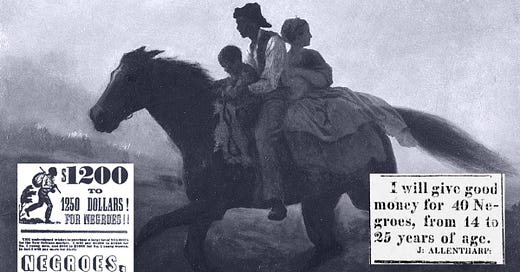Body, Bones and Blood: At The Purchaser's Option
Rhiannon Giddens reminds us of the stalwart strength of the souls of slaves
History is an unfolding and patient messenger.
It never reveals the total story in one full episode. It breaks up time and truth into smaller, more digestible pieces that can protect the wicked or give voice to the innocent.
More than not, the dilemma lies with the storyteller as being on the side of the victor or the victim. Nonetheless, there is always a lot to interpret.
For modern day Americans, the history of slavery is an unsavory part of our glorified past.
It is the historical precursor for much of the racial angst and animus in our multicultural experiment, now nearing 300 ‘official’ years.
Looking back is a gamble. It is often unpleasant. It often unearths the evil buried deep in the paperwork trail of every day business transactions.
“At The Purchaser's Option” represents just one of those discoveries.
The song is a searing reminder of our immoral action against other believers and fellow humans.
It bookmarks history at a time and place that is difficult to return to.
America the Blemished
Art is a truthteller. It is a powerful tool. It confronts pain and preserves human dignity.
Rhiannon Giddens, an American folk musician, is an artist who strives “to excavate the past and reveal bold truths about our present.”
The title "At the Purchaser's Option" comes directly from the language of slave advertisements that Giddens encountered during her research.
A banal notation on the ad set the song’s entire tone:
… children could be purchased separately or together with the mother—entirely "at the purchaser's option."
The buying and selling of human beings—including the deliberate separation of mothers from their infants—was conducted with the same commercial language used for livestock.
Chattel property is personal, it is moveable goods, whether cows or “coloreds.”
According to historians, half of all slave children were separated from family and sold. Thus, profit motive destroyed traditional Black families.
White American Exceptionalism
1860 is not that long ago, only 165 years from today.
In 1808, Congress outlawed the Transatlantic Slave Trade.
Without a supply chain, the strong demand for slaves was then met by “natural reproduction” or domestic trade. From 1810 to 1860, an estimated one million slaves were forcibly transferred to the Lower South to keep the economic machine rolling.
Giddens captures the horror of this horrifying ordeal for enslaved mothers:
I've got a babe but shall I keep him
'Twill come the day when I'll be weepin'
For healthy women, reproductive capacity became an economic asset for slaveholders.
I've got a body dark and strong
I was young but not for long
You took me to bed a little girl
Left me in a woman's world
There was no age of consent, only sexual exploitation.
In 1863, United States President Abraham Lincoln issued the Emancipation Proclamation that changed the legal status of over 3 million slaves to free people.
By that time, the enormous wealth extracted from slave labor provided the fuel to set the nation on its incomparable economic path.
Day by day I work the line
Every minute overtime
Fingers nimble, fingers quick
My fingers bleed to make you rich
It is hard to even imagine the irony.
A country built on capitalism and Christian values is part of the ruse. The backstory written for heroic figures forging a new lifestyle in a new land.
Reality offers a more sobering truth. One that minimizes the denigration of a group of human beings and commodifies them for extravagant financial gain.
The slave trade is not a set of embarrassing statistics. It is the record of human cost and the unraveling of the fabric of family life.
Amid this unconscionable chaos, Giddens delivers the essential truth of the human experience:
You can take my body
You can take my bones
You can take my blood
But not my soul
Coda
Songs are witnesses to the events in life.
Even when looking back, the search for truth demands accuracy over propaganda.
Today, we are awash in misinformation, narratives and half-truths at the click of a mouse. It is difficult to sort it all out.
We need songs to “cut to the quick” and hone in on what really matters.
Rhiannon Giddens’s haunting song confronts our human sensibilities.
Visceral truth is powerful.
Music has a unique power to make uncomfortable truths impossible to ignore.
Credits
Songwriters: Joseph Edward Ryan / Rhiannon Giddens Laffan
At the Purchaser’s Option lyrics © BMG Rights Management, Wixen Music Publishing
===================
If you like the songs and/or essays, please help me distribute them by sharing and following me on Twitter/X, Substack and now YouTube.
I appreciate your time and support in this endeavor.




